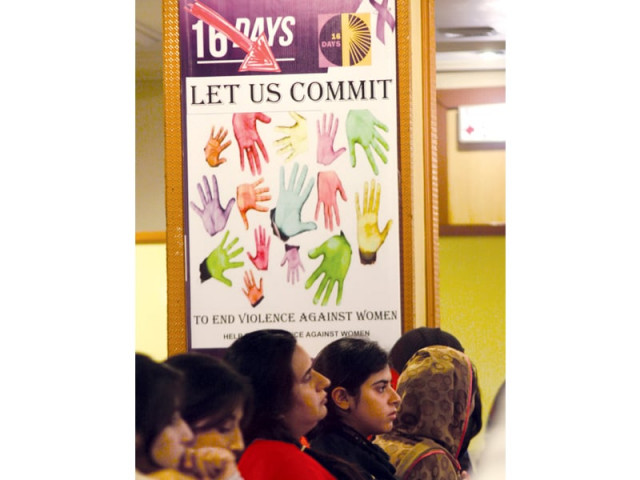The patriarchal glitch: Justice delayed is justice denied
Improving the criminal justice system requires top-down involvement: speakers.

Pakistan’s criminal justice system is confronted with serious crisis of delayed or no justice, which is a reason behind the increase in the cases of violence against women. These views were expressed at a panel discussion on improving the criminal justice system and combating violence against women on Thursday. The discussion was held in connection with the 16 days of activism that are taking place across the globe for ending gender-based violence.
Women rights activists, representatives of the legal fraternity and law enforcement agencies participated in the discussion. They expressed their concern over the gender biases prevalent in the criminal justice system; “such as rape victims being treated with disrespect and harassed by the officials at all levels”.
Speakers said it is unfortunate that although the government has signed various conventions to protect human rights, the desired goals and outcomes have been not been attained to protect women from violence. Women’s Organization for Rights and Development Executive Director Aqsa Khan said officials at all levels of the criminal justice system do not consider domestic violence a matter for the criminal courts and usually dismissing it as a private matter. “It is very unfortunate that female victims, who go to the police station to register complaints against their spouses or other family members, for physical abuse are turned away. This makes them feel very insecure and powerless,” she said.
Harris Khalique, a human rights campaigner, stressed that law making is usually done to protect those in power positions. The criminal justice system can only improve if no distinction is made on the basis of sex, caste, colour, class and religion.
Similarly, Advocate Mohsin Kiyani said cases are criminalised only on the basis of eye witness’ account and unlike some of the developed countries, circumstantial evidence is never considered. He added the parliamentarians have to commit to bring about more progressive legislations for women on important issues such as domestic violence and other forms of violence.
Targetting the misogynist mindset of the society, Dr Farzana Bari, a women’s rights activist, said, “With a misogynist mindset at the familial, social and institutional level, the social contract of the state is usually with the men as patriarchy favours and privileges only men.”
Defending the law-enforcers, Deputy Inspector General Ehsan Sadiq said people have too many expectations from the police, who are not the only part of the solution as the criminal justice system entails laws, courts, crime reporting, investigation, medical legal examination among others.
Meanwhile. Justice Nasira Iqbal reiterated the importance of awareness among women about their legal rights.
Nasreen Azhar, a member National Commission on the Status of Women read out a declaration jointly developed at the panel discussion, which aimed to make the criminal justice system unbiased and easily accessible for women to combat violence.
Published in The Express Tribune, December 9th, 2011.



















COMMENTS
Comments are moderated and generally will be posted if they are on-topic and not abusive.
For more information, please see our Comments FAQ